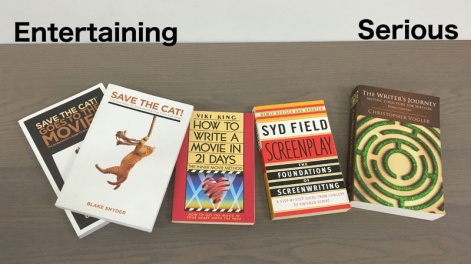Torulf Jernström is CEO of Finnish developer Tribeflame.
His blog is Pocket Philosopher.
There are some good books to read if you aspire to become a screenwriter in Hollywood.
A bunch of them all say the same thing: there's a pretty fixed structure to the script of a blockbuster.
Let me spoil most movies for you now: when everything is finally going just great for the hero, pause the movie and you will most likely find yourself at the midpoint.
When everything thereafter falls apart (bonus points if some minor character dies), pause again and your will be two-thirds through.
There are a number of books that will teach you the classic story telling model.
It's called "The Hero's Journey", and you have hopefully heard about it if you're developing games with a narrative component (ok.. let's say "story" instead).
As a reminder, it goes like this:
Act 1
- The story's world is introduced. It's in a stable state, we're introduced to the characters.
- The theme of the movie is introduced. Hints about what this is going to be about.
- Something disturbs the stable world
- Our hero should go on an adventure, but hesitates
- A mentor comes in and gives our hero a swift kick in the behind, and the hero gets going
Act 2:
- Love story & side plots are introduced
- Our hero is trying to adjust to the new world and new rules. Likely feels like a fish out of water. Most of the movie's trailer clips are from this part.
- MIDPOINT: our hero has finally learned the new rules and is victorious (but it's a false victory)
- Problems appear, stakes are raised
- ALL is LOST! Something dies.
Act 3:
- Fresh inspiration allows the hero to find a new way
- At the midpoint, our hero had learned the new rules, but forgotten about his/her real self. With a new combination of the original personality and the new things learned, our hero is finally victorious for real.
- Ending with how the world changed as a result of the adventure. Everyone grew and learned something (except for the bad guys). Contrast the new world with the world at the beginning.
There you go: just about every Hollywood blockbuster works according to these rules.
You can use it to annoy friends and relatives by telling them what comes next. If you want to learn more, here are some books about it.
- Entertaining books:
Save the cat!
How to write a movie in 21 days
- Serious books:
Screenplay
The Writer's Journey
The Hero with a Thousand Faces
However, the point I'm getting at here is not the straightforward idea that game stories should be just like movie stories.

Rather, it is that a related art form has developed some rules for what works; rules that have had a remarkable staying power.
You see, this structure does not only underpin movies, but stories overall.
Joseph Campbell abstracted The Hero's Journey by looking at stories in literature throughout human history, from early myths to recent books and movies. He found the popular ones so similar in structure, that they basically tell variants of the same story.
We need to understand where to innovate, and what parts are so fundamental that fighting them is futile.Torulf Jernström
Human psychology evolves very slowly, and therefore certain patterns appeal to us over millennia.
Likewise for other art forms: there is music theory and there are colour and composition theories for visual arts. The real point is that there is likely to be some design patterns for successful games too, and we need to discover them.
We need to understand where to innovate, and what parts are so fundamental that fighting them is futile.
Takeaway
For mobile Free-to-Play (F2P) games, I believe that designing for short sessions, several times per day, every day for months is a fundamental thing that will not change (see the number of the beast post for more).
How specifically to achieve that end is still likely to evolve.
We might also see more stories in mobile F2P games, but it's hard to produce hundreds of hours of storyline cost efficiently.
If we do see stories, I think they will likely adapt the TV series version of The Hero's Journey. That is, they run several of these story arcs overlapping.
There's always one story about to wrap up, one under way, and one just starting. Some arcs are longer, some shorter, etc. F2P games and soap operas are both never-ending.
This blog is about what we have so far learned about making games in general, and mobile F2P games in particular.
When reading about ideas and best practises, please think about if the practises presented are only the current fad, or are they the fundamental Hero's Journey rules of our art form.





















